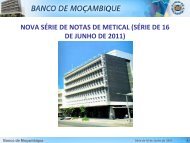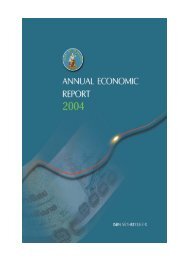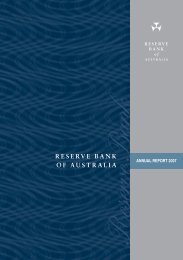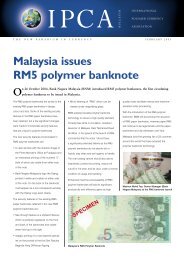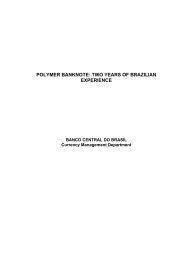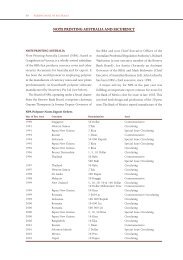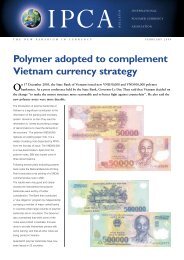ANNUAL REPORT 2008 - Polymer Bank Notes of the World
ANNUAL REPORT 2008 - Polymer Bank Notes of the World
ANNUAL REPORT 2008 - Polymer Bank Notes of the World
Create successful ePaper yourself
Turn your PDF publications into a flip-book with our unique Google optimized e-Paper software.
1 EUROPEAN ISSUESIn <strong>2008</strong> <strong>the</strong> ECB continued to have regularcontacts with European institutions and fora,particularly with <strong>the</strong> European Parliament(see Chapter 6), <strong>the</strong> ECOFIN Council, <strong>the</strong>Eurogroup and <strong>the</strong> European Commission. ThePresident <strong>of</strong> <strong>the</strong> ECB participated in meetings<strong>of</strong> <strong>the</strong> ECOFIN Council when matters relatingto <strong>the</strong> objectives and tasks <strong>of</strong> <strong>the</strong> ESCB werediscussed, as well as in <strong>the</strong> meetings <strong>of</strong> <strong>the</strong>Eurogroup. The President <strong>of</strong> <strong>the</strong> Eurogroup and<strong>the</strong> Commissioner for Economic and MonetaryAffairs attended meetings <strong>of</strong> <strong>the</strong> GoverningCouncil when <strong>the</strong>y deemed it appropriate.1.1 POLICY ISSUESTHE STABILITY AND GROWTH PACTIn <strong>2008</strong> <strong>the</strong> initially favourable macroeconomicenvironment supported <strong>the</strong> improvement <strong>of</strong>budget balances in most countries and hence<strong>the</strong> abrogation <strong>of</strong> excessive deficit proceduresfor five out <strong>of</strong> <strong>the</strong> six Member States with anexcessive deficit at <strong>the</strong> end <strong>of</strong> 2007. In June<strong>2008</strong> <strong>the</strong> ECOFIN Council brought to an end<strong>the</strong> excessive deficit procedures for <strong>the</strong> CzechRepublic, Italy, Portugal and Slovakia, andtook <strong>the</strong> same step for Poland in July <strong>2008</strong>. ForSlovakia, this removed a major obstacle to itsadoption <strong>of</strong> <strong>the</strong> euro in 2009. The revision <strong>of</strong><strong>the</strong> Greek deficit for 2007 from 2.8% to 3.5% <strong>of</strong>GDP did not lead to procedural steps under <strong>the</strong>excessive deficit procedure.However, <strong>the</strong> deterioration <strong>of</strong> <strong>the</strong> macroeconomicenvironment in <strong>the</strong> course <strong>of</strong> <strong>the</strong> year and <strong>the</strong>impact <strong>of</strong> <strong>the</strong> financial crisis on tax revenuesput pressure on public finances and led to <strong>the</strong>re-emergence <strong>of</strong> high deficits, especially incountries which were vulnerable owing toinsufficient consolidation in good times. InJuly <strong>2008</strong> <strong>the</strong> ECOFIN Council launched anexcessive deficit procedure against <strong>the</strong> UnitedKingdom, recommending under Article 104(7)<strong>of</strong> <strong>the</strong> Treaty that <strong>the</strong> United Kingdom shouldbring <strong>the</strong> deficit below 3% <strong>of</strong> GDP by <strong>the</strong>financial year 2009/10. Hungary remainedsubject to an ongoing excessive deficit procedureduring <strong>2008</strong>, with a deadline to correct <strong>the</strong>deficit by 2009 at <strong>the</strong> latest. In addition, inMay <strong>2008</strong> <strong>the</strong> Commission issued “economicand budgetary policy advice” to France,inviting <strong>the</strong> country to carry out <strong>the</strong> necessaryconsolidation <strong>of</strong> public finances and to pursuestructural reforms. Reflecting on <strong>the</strong> need for abinding medium-term fiscal framework and <strong>the</strong>risk <strong>of</strong> <strong>the</strong> deficit exceeding 3% <strong>of</strong> GDP, <strong>the</strong>Commission also gave advice to Romania inJune <strong>2008</strong>.In May <strong>the</strong> Eurogroup endorsed <strong>the</strong> policyframework set by <strong>the</strong> Stability and Growth Pact.Ministers noted that in several countries moreambitious policies would be needed to complywith <strong>the</strong> provisions <strong>of</strong> <strong>the</strong> preventive arm <strong>of</strong> <strong>the</strong>Pact and achieve <strong>the</strong> budgetary objectives <strong>of</strong> <strong>the</strong>2007 Berlin agreement, namely that MemberStates would achieve <strong>the</strong>ir medium-termobjectives in <strong>2008</strong> or 2009 and that all <strong>of</strong> <strong>the</strong>mshould aim for 2010 at <strong>the</strong> latest.As <strong>the</strong> financial turbulence increased over<strong>the</strong> year, leading to diminishing confidencein <strong>the</strong> financial sector, <strong>the</strong> ECOFIN Councilcalled in October for fiscal prudence to supportconfidence. Ministers reiterated that <strong>the</strong> Pactremained <strong>the</strong> adequate framework and should befully applied. In particular, automatic stabilisersshould help to cushion <strong>the</strong> expected slowdown.With regard to <strong>the</strong> long-term sustainability <strong>of</strong>public finances, <strong>the</strong> Council discussed proposalson how to include <strong>the</strong> ageing-induced fiscalburden in <strong>the</strong> definition <strong>of</strong> <strong>the</strong> medium-termobjectives.THE LISBON STRATEGYThe Lisbon strategy – <strong>the</strong> EU’s widerangingprogramme <strong>of</strong> economic, social andenvironmental reform – entered a new threeyearpolicy cycle in <strong>2008</strong>, <strong>the</strong> second cycle since<strong>the</strong> review <strong>of</strong> <strong>the</strong> strategy in 2005.In spring <strong>2008</strong> <strong>the</strong> European Council confirmed<strong>the</strong> Integrated Guidelines adopted for <strong>the</strong>2005-08 cycle and stressed that <strong>the</strong> focusduring <strong>the</strong> present cycle should be on <strong>the</strong>implementation <strong>of</strong> agreed objectives. Italso complemented <strong>the</strong>se guidelines with172 ECBAnnual Report<strong>2008</strong>



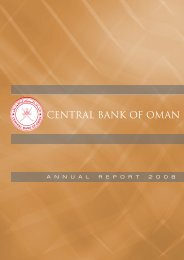
![KNOW YOUR NEW GIBRALTAR BANKNOTES - [Home] bThe/b](https://img.yumpu.com/50890985/1/184x260/know-your-new-gibraltar-banknotes-home-bthe-b.jpg?quality=85)
![PAPUA NEW GUINEA - [Home] - Polymer Bank Notes of the World](https://img.yumpu.com/49758743/1/190x143/papua-new-guinea-home-polymer-bank-notes-of-the-world.jpg?quality=85)

